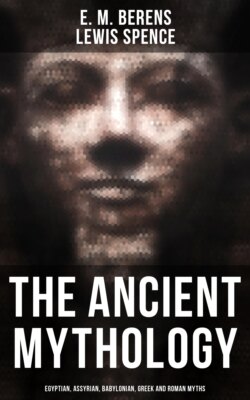Читать книгу The Ancient Mythology: Egyptian, Assyrian, Babylonian, Greek and Roman Myths - Lewis Spence - Страница 98
На сайте Литреса книга снята с продажи.
Ea in Later Times
ОглавлениеEa developed with the centuries, and about the epoch of Khammurabi appears to have achieved a high standard of godhead, probably because of the very considerable amount of theological moulding which he had received. In the later Babylonian period we find him described as the protagonist of mankind, the father of Merodach, and, along with Anu and Bel, a member of a great triad. The priests of Babylon were the sole mythographers of these days. This is in sharp contradistinction to the mythographers of Greece, who were nearly always philosophers and never priests. But they were mythographers in a secondary sense only, for they merely rearranged, re-edited, or otherwise altered already existing tales relating to the gods, usually with a view to the exaltation of a certain deity or to enable his story to fit in with those of other gods. It is only after a religion or mythological system has enjoyed a vogue more or less extended that the relationship of the gods towards one another becomes fixed.
The appointment of Merodach to the supreme position in the Babylonian pantheon naturally necessitated a rearrangement so far as the relationship of the other deities to him was concerned. This meant a re-shaping of myth and tradition generally for the purpose of ensuring consistency. The men fitted to accomplish such a task were to hand, for the age of Khammurabi was fertile in writers, scholastic and legal, who would be well equipped to carry out a change of the description indicated. Ea had not in the past enjoyed any very exalted sphere. But as the chief god of the important country in the neighbourhood of the Persian Gulf, the most ancient home of Babylonian culture, Ea would probably have exercised a great influence upon the antiquarian and historic sense of a man like Khammurabi. As the god of wisdom he would strongly appeal to a monarch whose whole career was marked by a love of justice and by sagacity and insight. From a local god of Eridu, Ea became a universal deity of wisdom and beneficence, the strong shield of man, and his benefactor by the gifts of harvest and water. Civilized and softer emotions must have begun to cluster around the cult of this kindly god who, when the angered deities resolved to destroy mankind, interceded for poor humanity and succeeded in preserving it from the divine wrath. As a god of medicine, too, Ea is humane and protective in character, and all the arts fall under his patronage. He is the culture-god of Babylon par excellence. He might not transcend Merodach, so he became his father. Thus did pagan theology succeed in merging the cults of deities which might otherwise have been serious rivals and mutually destructive.
